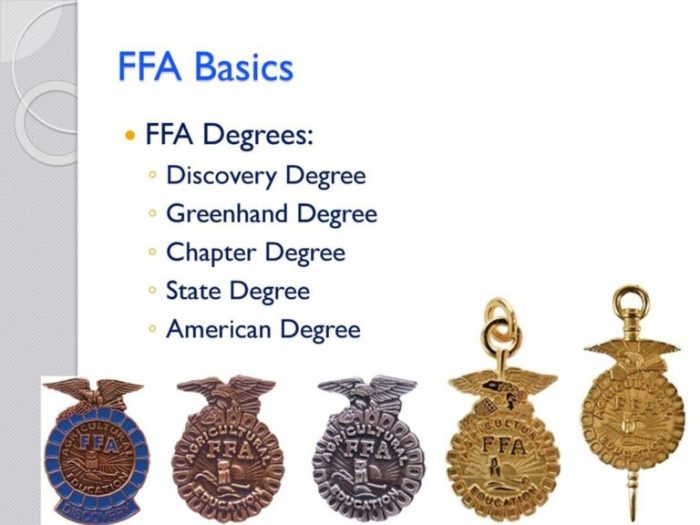Requirements for american ffa degree – The American FFA Degree is a prestigious recognition bestowed upon students who excel in agricultural education. This comprehensive program not only provides students with a strong foundation in agricultural knowledge and skills but also fosters their leadership abilities, personal growth, and community involvement.
Embarking on this journey unlocks a world of opportunities for students to develop their potential and prepare for successful careers in the agricultural industry.
The FFA degree program is structured into three levels: Greenhand, Chapter, and State. Each level has specific requirements that students must meet to advance. These requirements encompass a range of activities, including supervised agricultural experience (SAE), leadership development, career and technical education, community involvement, and personal growth and development.
Overview of FFA Degree Requirements

The Future Farmers of America (FFA) degree program is a nationally recognized system of agricultural education that provides students with the opportunity to develop their leadership, personal growth, and career skills. The FFA degree program is divided into three levels: Greenhand, Chapter, and State.
Each level has its own set of requirements that students must meet in order to earn the corresponding degree.
Greenhand FFA Degree, Requirements for american ffa degree
The Greenhand FFA Degree is the first level of the FFA degree program. To earn the Greenhand FFA Degree, students must complete the following requirements:
- Be enrolled in an agricultural education course.
- Complete 40 hours of supervised agricultural experience (SAE).
- Attend at least six FFA meetings.
- Participate in at least one FFA activity.
- Maintain a satisfactory academic record.
Chapter FFA Degree
The Chapter FFA Degree is the second level of the FFA degree program. To earn the Chapter FFA Degree, students must complete the following requirements:
- Be enrolled in an agricultural education course.
- Complete 120 hours of supervised agricultural experience (SAE).
- Attend at least 12 FFA meetings.
- Participate in at least two FFA activities.
- Hold a chapter office or serve on a chapter committee.
- Maintain a satisfactory academic record.
State FFA Degree
The State FFA Degree is the highest level of the FFA degree program. To earn the State FFA Degree, students must complete the following requirements:
- Be enrolled in an agricultural education course.
- Complete 240 hours of supervised agricultural experience (SAE).
- Attend at least 18 FFA meetings.
- Participate in at least three FFA activities.
- Hold a state office or serve on a state committee.
- Maintain a satisfactory academic record.
Supervised Agricultural Experience (SAE)

SAE is a critical component of the FFA degree program. It provides students with hands-on experience in the agricultural industry and helps them develop the skills and knowledge necessary for success in the field.SAE projects can take many different forms, including:
- Conducting agricultural research
- Working on a farm or ranch
- Starting a small business
- Participating in agricultural competitions
Through SAE, students learn about the different aspects of agriculture, develop leadership skills, and gain a sense of responsibility. SAE also helps students to explore their interests and identify career paths that they may want to pursue.
Leadership Development

Leadership is a fundamental aspect of the FFA program, empowering members to develop their skills and contribute to their communities. FFA provides a structured framework for leadership development, offering various opportunities for members to assume leadership roles and responsibilities.
FFA members can participate in various leadership activities, including serving as chapter officers, organizing community service projects, and representing FFA at local, state, and national events. These experiences foster essential leadership qualities such as communication, teamwork, decision-making, and problem-solving.
Successful Leadership Projects
FFA members have implemented numerous successful leadership projects that have made a positive impact on their communities. Examples include:
- Organizing food drives to combat hunger
- Leading environmental cleanup initiatives
- Establishing community gardens to promote healthy eating
li>Developing youth leadership programs
Career and Technical Education

The Future Farmers of America (FFA) is closely aligned with career and technical education (CTE), recognizing the importance of practical skills and knowledge in agricultural careers. FFA provides students with opportunities to develop hands-on experience, leadership abilities, and a strong foundation in agricultural science.
Through its programs and activities, FFA prepares students for a wide range of agricultural careers, including:
- Agricultural production
- Agricultural business
- Agricultural research
- Agricultural education
- Agricultural technology
FFA Programs Focusing on Specific Agricultural Pathways
FFA offers a variety of programs that focus on specific agricultural pathways, allowing students to specialize in areas that align with their interests and career goals. Some examples of these programs include:
- Agricultural Science:This program provides students with a comprehensive understanding of agricultural science, including plant and animal science, soil science, and agricultural technology.
- Agricultural Business:This program prepares students for careers in agricultural business management, marketing, and finance.
- Agricultural Mechanics:This program focuses on the maintenance and repair of agricultural equipment, including tractors, combines, and irrigation systems.
- Agricultural Leadership:This program develops leadership skills and prepares students for roles in agricultural organizations and cooperatives.
Community Involvement

Community involvement is a crucial aspect of the FFA program, fostering a sense of responsibility and civic engagement among its members. By participating in community service projects, FFA members contribute to their communities while developing valuable skills and qualities.
FFA members engage with their communities in various ways, such as:
Volunteerism
- Volunteering at local food banks or soup kitchens
- Assisting with community clean-ups or beautification projects
- Tutoring or mentoring underprivileged students
Advocacy
- Speaking out on behalf of agricultural issues
- Promoting the importance of agriculture to the general public
- Participating in policy discussions that impact the agricultural industry
Community Service Projects
- Building or repairing community gardens
- Organizing fundraisers for local charities
- Hosting community events, such as farmers’ markets or agricultural fairs
Successful community service projects often align with the FFA’s mission of promoting agricultural education and leadership. Examples include:
- FFA chapters partnering with local farmers to donate produce to food banks
- Members conducting workshops on sustainable farming practices for the community
- FFA chapters organizing youth agricultural camps to engage the next generation of agriculturalists
Through community involvement, FFA members not only make a positive impact on their communities but also gain valuable experience in teamwork, communication, and leadership. These experiences contribute to their personal growth and prepare them for future success in agricultural careers and beyond.
Personal Growth and Development: Requirements For American Ffa Degree

FFA provides ample opportunities for personal growth and development through various programs and activities. Members can acquire valuable skills and values that contribute to their overall well-being and future success.FFA emphasizes leadership, communication, and teamwork skills. Members participate in public speaking contests, parliamentary procedure, and other activities that enhance their ability to articulate ideas, work effectively in groups, and take on leadership roles.
The program also promotes a strong work ethic, responsibility, and accountability.FFA fosters a sense of community and belonging. Members connect with peers who share similar interests and aspirations. They learn to work together, support each other, and develop a strong network of relationships.
The program encourages members to contribute to their communities through service projects and volunteerism, instilling a sense of civic responsibility and empathy.FFA has positively impacted the personal lives of numerous members. Many alumni attribute their success in higher education, careers, and personal relationships to the skills and values they acquired through FFA.
The program provides a supportive environment where members can explore their interests, develop their talents, and grow as individuals.
Question Bank
What are the benefits of earning the American FFA Degree?
The American FFA Degree provides students with numerous benefits, including enhanced agricultural knowledge and skills, leadership development, career preparation, community involvement opportunities, and personal growth.
What are the requirements for the Greenhand FFA Degree?
To earn the Greenhand FFA Degree, students must complete a minimum of 40 hours of supervised agricultural experience (SAE), participate in FFA meetings and activities, and demonstrate proficiency in basic agricultural knowledge and skills.
How can I prepare for the State FFA Degree?
Preparing for the State FFA Degree requires students to complete a substantial supervised agricultural experience project, develop a portfolio showcasing their leadership and career development activities, and participate in state-level FFA events and competitions.